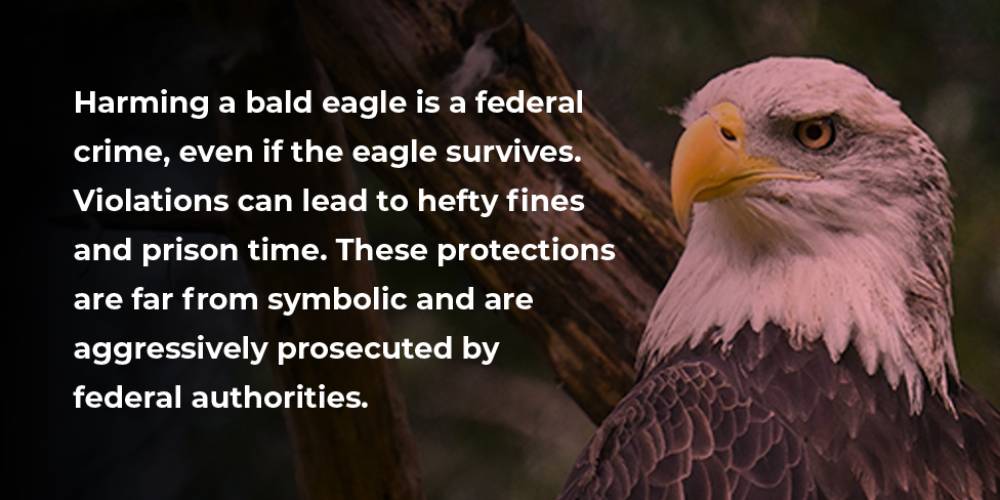TELEPHONES ANSWERED 24 HOURS A DAY
Is it Really a Federal Crime to Kill a Bald Eagle?
 In June 2025, a Virginia hunter was convicted of poisoning more than 20 juvenile bald eagles and red-shouldered hawks by lacing fish heads with carbofuran, a banned pesticide. One eagle was filmed suffering for hours before dying. Despite the scale of the harm, the hunter received only one day in jail, probation, and a fine of nearly $10,000. This raised serious questions about how federal wildlife laws are enforced.
In June 2025, a Virginia hunter was convicted of poisoning more than 20 juvenile bald eagles and red-shouldered hawks by lacing fish heads with carbofuran, a banned pesticide. One eagle was filmed suffering for hours before dying. Despite the scale of the harm, the hunter received only one day in jail, probation, and a fine of nearly $10,000. This raised serious questions about how federal wildlife laws are enforced.
Cases like this remind the public that harming a bald eagle is a federal crime, even if the eagle survives. Violations can lead to hefty fines and prison time. These protections are far from symbolic and are aggressively prosecuted by federal authorities. If you are facing investigation or charges, you should speak with an experienced Chicago, IL federal criminal defense attorney immediately.
What Is the Bald and Golden Eagle Protection Act?
The Bald and Golden Eagle Protection Act was passed by Congress in 1940 to protect bald eagles, whose population was rapidly declining. In 1962, the law was expanded to include golden eagles. The goal of the act is to ensure the survival of these birds by making it illegal to harm or exploit them in any way.
Under the act, it is a federal crime to kill, sell, own, or even offer to sell or own a bald or golden eagle. This protection also applies to eagle feathers, nests, eggs, and any body part. Even actions like harassing an eagle, such as disturbing it while nesting, can be a violation. This is true even if the eagle is not physically harmed. People who legally owned eagle parts before the law was passed are not breaking the law by keeping them, but they cannot sell or trade them.
What Are the Penalties Under the Bald and Golden Eagle Protection Act?
Violating the Bald and Golden Eagle Protection Act can result in serious legal consequences. A first-time violation is usually charged as a misdemeanor and can carry penalties of up to one year in jail and a $100,000 fine for individuals, or $200,000 for organizations. If the offense is done knowingly or involves commercial activity, such as selling eagle feathers or parts, it can be charged as a felony. A felony conviction may result in up to two years in federal prison, along with much steeper fines, like up to $250,000 for individuals and $500,000 for organizations. These penalties apply whether or not the eagle is killed.
What Other Federal Laws Protect Endangered and Threatened Wildlife?
In addition to the Eagle Act, two other federal laws play a key role in wildlife protection. The Migratory Bird Treaty Act (MBTA) makes it illegal to pursue, hunt, capture, kill, or sell migratory birds, including their nests and eggs, unless authorized by a valid permit. Bald eagles are included under this law.
The Endangered Species Act (ESA) also protects animals and plants that are considered endangered or threatened. While the bald eagle was removed from the endangered species list in 2007 due to successful conservation efforts, many other species still benefit from ESA protections. For example, as of July 2025, the grizzly bear, the whooping crane, the Florida manatee, and the California spotted owl are all protected. Violating the ESA can result in fines of up to $50,000 and one year in prison.
What Counts as Harassment of Wildlife Under Federal Law?
Federal law defines harassment as any act that disrupts the normal behavior of protected wildlife. This can include interference with feeding, breeding, or sheltering. You do not have to physically harm an animal to be charged with harassment. Examples of actions that may be considered harassment include:
-
Flying drones near eagle nesting sites
-
Using loud equipment or explosives near wildlife habitats
-
Taking photographs too close to active nests
-
Repeatedly approaching or flushing birds from feeding or roosting areas
-
Letting pets roam near protected wildlife
-
Destroying or disturbing nests, even if they are unoccupied at the time
These actions may seem harmless, but they can cause stress or drive animals away from their territory, which violates federal protection laws.

Is Ignorance of Wildlife Protection Laws a Valid Legal Defense?
Generally, not knowing the law is not a valid defense to federal wildlife charges. Most of these offenses are considered strict liability crimes, meaning you can be convicted even if you did not intend to break the law. However, depending on the facts of your case, there may be valid defenses available. Possible examples include:
-
No actual disturbance or harm: If prosecutors cannot show that your actions disrupted nesting, feeding, or breeding, the charge may not stand.
-
Mistaken identity: You may have been wrongly accused or confused with someone else who committed the violation.
-
Lack of evidence: If there is no clear proof that you violated the law, such as no physical evidence or reliable witnesses, the case may be dismissed.
-
Lawful possession: If you owned eagle parts legally before the law was enacted or have a valid federal permit, you may have a defense.
A strong defense relies on solid evidence. Helpful materials may include photos or videos showing no contact with wildlife, GPS data proving your location, expert testimony about the species involved, and witness statements supporting your version of events. You may also use permit records, environmental reports, or conservation notices as supporting documents. A knowledgeable defense attorney can help evaluate the specific facts of your case and determine the best strategy and evidence to fight any charges against you.
Facing Charges? Our Chicago, IL Federal Criminal Defense Attorney Can Help
If you are facing federal charges for harming or disturbing protected wildlife, you need an experienced attorney who understands how to navigate complex federal laws and fight to protect your rights. Attorney Garfinkel at Law Offices of Hal M. Garfinkel LLC, Chicago Criminal Defense Attorney has earned a strong reputation throughout Illinois as an aggressive trial lawyer, having handled high-profile cases as both a former prosecutor and a dedicated criminal defense attorney. He brings depth of legal knowledge and courtroom strategy to every case. Call 312-629-0669 today and speak with a Chicago, IL federal crimes defense lawyer you can trust.



